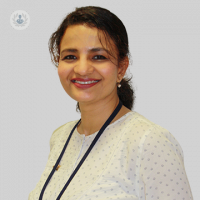Colposcopy: Expert insight on what to expect
Written by:Women are commonly invited to undergo a colposcopy procedure when abnormal cells have been detected in cervical screening tests. Although it may sound daunting, most women experience little to no discomfort during their procedure. In this informative article, revered consultant obstetrician and gynaecologist Miss Sameena Kausar offers expert guidance on what to expect from a colposcopy procedure.

What is a colposcopy?
A colposcopy is a test to take a closer look at your cervix using a microscope. It may be performed if cervical screening finds changes to your cells that are caused by certain types of human papillomavirus (HPV). These changed cells can, in some cases, turn into cervical cancer cells.
How is a colposcopy performed?
During a colposcopy, a smooth, tube-shaped tool (a speculum) is gently placed into your vagina to open it. A microscope (which remains outside of your body) is then used to look at your cervix in greater detail. A small sample of cells may be taken from your cervix for testing. This is called a biopsy.
Is a colposcopy painful?
A colposcopy should not be painful, but it can sometimes feel uncomfortable. If something doesn’t feel right, you can ask for the procedure to be stopped at any time. It is very similar to your routine smear test. Some patients find it uncomfortable as it is an examination of sensitive areas. Any biopsies taken are done so under local anesthetic.
What are the possible complications of a colposcopy?
Colposcopy is performed as an aseptic procedure to help protect from infections. There is a very small risk of infection is a biopsy is taken. Mild spotting is to be expected for twenty-four to forty-eight hours after the procedure.
How accurate is colposcopy in detecting cervical abnormalities or cancer?
Colposcopy alone has a seventy per cent sensitive probability of a positive test result, increasing to ninety-five per cent sensitive if a biopsy is taken. If the doctor or nurse finds abnormal cells in your cervix, they may recommend removing them. This will reduce your risk of cervical cancer. They may do this treatment on the same day as your colposcopy, or you might be asked to come back for another appointment.
If you wish to schedule a consultation with Miss Kausar, you can do so by visiting her Top Doctors profile.


